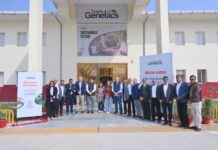In response to growing concerns over the environmental impact of food packaging, Japanese companies are taking innovative steps to cut emissions without compromising quality. A new collaboration between Don Quijote (Pan Pacific International Holdings Corporation), Sagawa Printing and Asahi Kasei—parent company of Asahi Photoproducts—has led to a significant reduction in CO2 emissions in the printing of frozen pasta packaging.
For the private-label ‘Yaba Mori Pasta’ series, Don Quijote has chosen to implement water-based flexographic printing, using Asahi’s AWP water-washable flexographic plate. This printing method replaces conventional solvent-based gravure printing, a dominant practice in Japan, and marks a forward-thinking step in sustainable food packaging.
Sagawa Printing established the optimal printing conditions for this transition in close collaboration with Asahi Kasei. According to their calculations, this method is expected to reduce CO₂ emissions from the printing process by approximately 60 percent compared to conventional gravure systems.
Water-based flexographic printing inherently generates fewer emissions, thanks to the water-based inks and the AWP plate’s development process.
While solvent-based gravure printing continues to dominate Japan’s packaging industry, growing environmental awareness is driving interest in more sustainable alternatives. The ‘Yaba Mori Pasta’ packaging serves as a tangible example of how food brands can reduce their environmental footprint through innovation in print technology.
Through partnerships like this, Asahi aims to contribute to a more sustainable society, promoting the elimination of VOCs and supporting cleaner production processes across the food packaging sector.
Sustainable shif
Asahi’s AWP (Asahi Water-Washable Plate) represents an innovative approach to flexographic platemaking, replacing traditional solvent-based processes with water-based solutions. This advanced technology eliminates the need for organic solvents during plate development, significantly reducing volatile organic compound (VOC) emissions and improving safety and environmental performance at printing sites. Moreover, AWP plates enhance print consistency, improve productivity, and deliver exceptional print quality, making them particularly suitable for high-standard food packaging applications.
The adoption of AWP technology is central to Asahi’s broader Solvent ZERO initiative, aimed at helping the packaging and printing industries transition away from solvent-based systems towards fully sustainable production methods. Through Solvent ZERO, Asahi encourages printers worldwide to adopt water-based flexographic systems, promoting cleaner air, safer working environments, and substantial reductions in carbon footprints. The ‘Yaba Mori Pasta’ packaging project clearly demonstrates the practical benefits of embracing such advanced flexographic solutions, highlighting measurable sustainability gains without compromising print quality or operational efficiency.
By driving industry-wide adoption of its Solvent ZERO principles, Asahi actively supports global sustainability goals and the growing demand for environmentally responsible packaging solutions.
IndiFoodBev — authentic, impactful and influential
An English-language food and beverage processing and packaging industry B2B platform in print and web, IndiFoodBev is in its third year of publication. It is said that the Indian food and beverage industries represent approximately US$ 900 billion in revenues which implies more than 20% of the country’s GDP. Eliminating the wastage on the farmside can help to deliver more protein to a higher number of the population apart from generating sizable exports. The savings in soil, seeds, water, fertilizer, energy and ultimately food and nutrition could be the most immense contribution that country is poised to make to the moderation of climate change.
To improve your marketing and grow sales to the food and beverage processing and packaging industry, talk to us. Our research and consulting company IppStar [www.ippstar.org] can assess your potential and addressable markets in light of the competition. We can discuss marketing, communication, and sales strategies for market entry and growth.
Suppliers and service providers with a strategy and budget for targeted marketing can discuss using our hybrid print, web, video, and social media channels to create brand recognition linked to market relevance. Our technical writers are ready to meet you and your customers for content.
The second largest producer of fruit and vegetables in the world is continuously expanding processing capacities and delivery systems with appropriate innovative technologies. We cover product and consumer trends, nutrition, processing, research, equipment and packaging from farm to thali. Get our 2025 media kit and recalibrate your role in this dynamic market. Enhance your visibility and relevance to existing markets and turn potential customers into conversations. Ask for a sample copy of our bi-monthly in print or our weekly IndiFoodBev eZine each Wednesday.
For editorial info@ippgroup.in — for advertisement ads1@ippgroup.in and for subscriptions subscription@ippgroup.in
Naresh Khanna – 10 February 2025
Subscribe Now











